Company LAW Exams Answers PDF

| Title | Company LAW Exams Answers |
|---|---|
| Course | Law |
| Institution | University of Professional Studies |
| Pages | 6 |
| File Size | 168.7 KB |
| File Type | |
| Total Downloads | 27 |
| Total Views | 185 |
Summary
Download Company LAW Exams Answers PDF
Description
TIPS ON COMPANY LAW QUESTION 1 (i)
Virtually every company formed must be promoted. The promoters are a group of persons who control the affairs of a company (when it is not yet incorporated). For the company to come into being, someone must take the responsibility for the statutory requirements and so promoters are the people who conceive the idea of forming a company, draw the business plan, register the regulations of the company as well as raise the initial finance, etc. (In Erlanger v New Sombrero (1878) 3 AC 1218 per Lord Cairns :
“They (promoters) have in their hands the creation and molding of the company. They have the power of defining how and when and in what shape the company….” Section 10(1) of Act 992 defines a promoter as a person who is or has been engaged or interested in the formation of a company is a promoter of that company.
Section 10(4) of the Companies Act, 2019 (Act 992) provides that a promoter that acquires property or information in circumstances in which it was the duty of the promoter as a fiduciary to acquire the property or information on behalf of the company, shall account to the company for the property or information and for the profit which the promoter may have made from the use of that property or information. The Courts have held in the decided cases below that promoters are entitled to enter into contracts on behalf of the yet to- be born company and make profits. However, these profits are made on behalf of the company and not their (promoters) individual profits, hence they are under a legal obligation to disclose all such profits and render a proper account to the company after incorporation.
GLUCKSTEIN v BARNES [1900] Ac 240. FACTS: a company by the name of National Agricultural Hall Company Ltd owned a place of entertainment called Olympia. The company was being wound up. A syndicate was formed to buy and resell Olympia. By an agreement between the syndicate and the appellant, the syndicate
proposed to purchase Olympia with a view to the resale to a company to be registered or to some other purchaser. The agreement stated that a fund was to be raised and that if the company was formed the appellant and three other persons who were members of the syndicate had consented to be directors of the proposed company to be formed and that those 4 persons were to act as trustees for the syndicate with powers to buy and sell Olympia, to promote and register the intended company and to purchase any first mortgage bonds of the company which was in liquidation. The fund was raised and the trustees for the syndicate bought up some of the debenture bonds of the company being wound up at a discount and also a mortgage for a price far below its worth. (i.e 10,000 for the price of 500). The syndicate later bought the Olympia property for 140,000.. By an agreement between the syndicate trustees and the trustee for the intended company, it was agreed inter alia that the company should buy Olympia for 180,000. clause 7 of the agreement stated that the validity of the agreement shall not be impeached on the ground that the vendor parties (i.e. the syndicate trustees) as promoters or otherwise stand in a fiduciary relationship to the company nor shall they be required to account for any profit made or to be made by them by the purchase of debentures or of any other charge upon the property of the wound up company. The company was subsequently registered as Olympia Ltd.(ie. The proposed company). The company’s regulations said the company should carry out the above agreement with the trustee of the then intended company and that the agreement should be binding and carried into effect by the directors. It should be noted that clause 7 of the agreement was not referred to. A prospectus was later issued out inviting applications for shares and debentures in the new company. The prospectus contained a statement that the promoters of the company who constituted the entire board of the company had bought the property for 140,000 and that they would be selling the property to the company for 180,000. They made scanty reference to their dealings with the debenture and mortgage of the old wound up company. The prospectus was silent on clause 7 of the agreement. In addition to the 40,000 profit which the prospectus stated, the syndicate realized more than 20,000 profits which were realized from the debentures and mortgage of the old company. Of this profit, the trustees (promoters) received their shares. Later on the new company went into liquidation after shares and debentures had been issued.
The official receiver and liquidator (the respondent) of the company took out a summons against the appellant under section 10 of the English companies winding Up Act of 1890. The summons was dismissed but the court of appeal reversed the decision of the first court and ordered the appellant to pay the profit he received from the debentures with interest to the official receiver. The case went on appeal to the House of Lords. The Court held and dismissed the appeal in the case supra by holding that the appellant and indeed all the other members of the syndicate were not entitled to keep the secret profits they made. Per Earl of Halsbury L.C. “I decline to discuss the question of disclosure to the company. It is too absurd to suggest that a disclosure to the parties to this transaction is a disclosure to the company of which these directors were the proper guardians and trustees”. “I do not discuss either the sum sued for, or why Gluckstein (appellant) alone is sued. The whole sum has been obtained by a very gross fraud and all who were parties to it are responsible to make good what they have obtained and withheld from the shareholders”. Another classical case which also affirmed the position of the court supra is that of RE LEEDS v. HANLEY THEATRE (1902) 2 ch 807. in this case the promoters purchased the subject matter of the litigation with the intention of selling it to the company when formed. Subsequently the promoters transferred it to their trustee who later transferred it to a trustee of the intended company. there was no disclosure that the trustee was acting in the interest of the promoters.(fill in here) Where Sterling LJ held that: “It was their duty as such promoters dealing with and proposing that the company which they were promoting should acquire property belonging to themselves, to provide the company with an executive who shall both be aware that the property which they had been asked to buy is the property of the promoters”. In conclusion, promoters to a company have the right to make profits whilst entering into a contract on behalf of a company yet to be born. However, they owe a fiduciary duty to the company in disclosing all profits made after incorporation.
(ii)
The general principle under Section 11(2) of the Companies Act, 2019 (Act 992) is to the effect that a company is entitled to claim for profits made by its promoters after ratification of such contracts. Section 11(2) of Act 992 stipulates below: “On ratification under subsection (1), the company shall become bound by, and entitled to the benefit of, that contract or that transaction as if the company has been in exis tence at the date of that contract or other transaction and had been a party to the contract or other transaction.”
(iii)
The general principle is to the effect that a person acting in his professional capacity towards the formation of a company is not a promoter. This provision has been enshrined under SECTION 10(2) OF ACT 992 and it reads: “A person acting in a professional capacity for persons engaged in procuring the formation of a company is not a promoter of that company.”
QUESTION 2 The answer to question 2 is provided for under Section 13-16 of Act 992. A copy of Act 992 will be made available. Also make reference to Mr. Adagewine’s book titled “Company and Partnership Law in Ghana” at Page 127 on commencement of business.
QUESTION 3 (a) Make reference to Mr. Adagewine’s book titled “Company and Partnership Law in Ghana” at Page 24 on liabilities of incoming and Outgoing partners. (b) Make reference to Mr. Adagewine’s book titled “Company and Partnership Law in Ghana” at Page 11 on Grounds on which the Registrar can lawfully refuse to register a partnership.
QUESTION 4 Area of law – Presumption of Regularity (Internal Management Rule) and the Doctrine of Ultra Vires. ISSUES: (1) Whether or not Asesewaa Company Ltd who has no prior knowledge as to the constitution of the company forbidding the grant of loan in excess of Ghc 50, 000 with authorization from the board of directors is entitled to the loan? (2) Whether or not the UPA Bank is entitled to recall the loan on the basis that the director acted in excess of the powers granted to him under the constitution of the company.
The general principle underlying the rule in presumption of regularity is to the effect that whoever deals with a company assumes that the company is registered under incorporation. This provision has been provided for under Section 150(1)(a) of Act 992 and it reads: “1) A person having dealings with a company or with any other person who derives title under the company is entitled to assume that, (a) the company has been duly incorporated under this Act. Applicable cases to use in analyzing the issues: ROYAL BRITISH BANK V TURQUAND The rule in Turquand’s case is based on business efficacy, that the person dealing with the company cannot be reasonably expected to find out the details of the internal management of the company . BOOHENE V NATIONAL SAVINGS & CREDIT BANK [1992] 1 GLR 175. Held: (1) in accordance with the Contracts Act, 1960 (Act 25), s.14, the only requirements which a guarantee should conform to in Ghana were that it should be in writing and signed by the guarantor or his agent. The law did not presume any particular form that a guarantee should conform to besides that prescribed by that section. Therefore to the extent that exhibit A was in writing and signed by an officer of the first defendant-bank, the branch accountant, it satisfied the requirements of a guarantee and would be treated as such. Accordingly, the plaintiffs could not be bound by the peculiar form in which the first defendants furnished guarantees to their customers in the absence
of proof that that peculiar form (exhibit 5) had been so publicised as to put on notice anyone accepting a guarantee from the first defendants. Accordingly the first defendants could not use exhibit 5 to vitiate exhibit A, which had complied with section 14 of Act 25, merely because the latter was in a different form.
(3) It was a well-established presumption in the common law that an outsider dealing with a company was entitled to presume that its internal regulations had been complied with.
Note: Also refer to Make reference to Mr. Adagewine’s book titled “Company and Partnership Law in Ghana” at Page 97- 98 on Presumption of Regularity....
Similar Free PDFs

Company LAW Exams Answers
- 6 Pages

Family Law past exams answers
- 22 Pages

PGDL Company Law Model Answers
- 18 Pages

Company LAW MCQS WITH Answers
- 39 Pages

Company law
- 55 Pages
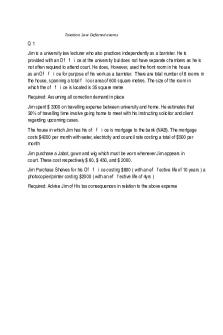
Taxation Law Deferred exams
- 7 Pages
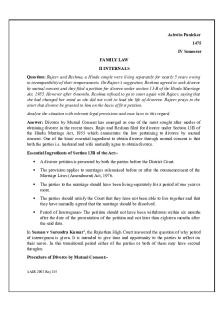
Family Law Internal Exams
- 4 Pages
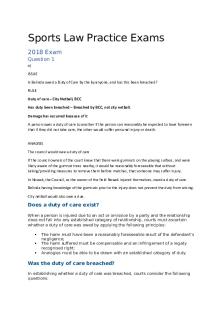
Sports Law Practice Exams
- 2 Pages

OOP - exams answers
- 25 Pages
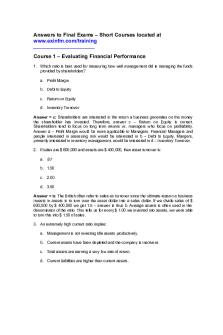
Answers to Final Exams
- 42 Pages

Company Law - kkkkkkkkkkkkk
- 206 Pages

MCQ Company Law
- 25 Pages

Company Law 2018
- 89 Pages
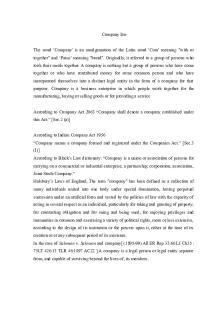
Company law lecture notes
- 9 Pages
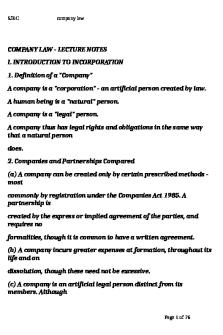
COMPANY LAW -LECTURE NOTES
- 48 Pages

Company Law Outlines
- 67 Pages
Popular Institutions
- Tinajero National High School - Annex
- Politeknik Caltex Riau
- Yokohama City University
- SGT University
- University of Al-Qadisiyah
- Divine Word College of Vigan
- Techniek College Rotterdam
- Universidade de Santiago
- Universiti Teknologi MARA Cawangan Johor Kampus Pasir Gudang
- Poltekkes Kemenkes Yogyakarta
- Baguio City National High School
- Colegio san marcos
- preparatoria uno
- Centro de Bachillerato Tecnológico Industrial y de Servicios No. 107
- Dalian Maritime University
- Quang Trung Secondary School
- Colegio Tecnológico en Informática
- Corporación Regional de Educación Superior
- Grupo CEDVA
- Dar Al Uloom University
- Centro de Estudios Preuniversitarios de la Universidad Nacional de Ingeniería
- 上智大学
- Aakash International School, Nuna Majara
- San Felipe Neri Catholic School
- Kang Chiao International School - New Taipei City
- Misamis Occidental National High School
- Institución Educativa Escuela Normal Juan Ladrilleros
- Kolehiyo ng Pantukan
- Batanes State College
- Instituto Continental
- Sekolah Menengah Kejuruan Kesehatan Kaltara (Tarakan)
- Colegio de La Inmaculada Concepcion - Cebu